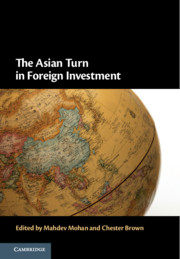Book contents
- The Asian Turn in Foreign Investment
- The Asian Turn in Foreign Investment
- Copyright page
- Contents
- Figures
- Tables
- Contributors
- Acknowledgements
- Table of Cases
- Table of Treaties
- Abbreviations
- Part I Introduction
- Part II National Approaches within Asia to the Regulation and Protection of Foreign Investment
- Part III The Rebalancing of Regulatory Space and Investor Protection in Asia
- Part IV Multilateral Rule-Making in Asia on Trade and Investment: From ASEAN to the Comprehensive and Progressive Agreement for Trans-Pacific Partnership
- Part V Emerging Issues
- 15 The Due Diligence Expansion in International Investment Arbitration
- 16 Combating Haze Pollution through the Enforcement of Investment Treaties and Human Rights
- 17 Transparency in Investor–State Arbitration
- 18 Third-Party Funding in Asia
- 19 Settling Investment Disputes through Mediation
- 20 The Singapore Convention on Mediation
- Part VI What Lies Ahead?
- Index
20 - The Singapore Convention on Mediation
Origins and Application to Investor–State Disputes
from Part V - Emerging Issues
Published online by Cambridge University Press: 13 August 2021
- The Asian Turn in Foreign Investment
- The Asian Turn in Foreign Investment
- Copyright page
- Contents
- Figures
- Tables
- Contributors
- Acknowledgements
- Table of Cases
- Table of Treaties
- Abbreviations
- Part I Introduction
- Part II National Approaches within Asia to the Regulation and Protection of Foreign Investment
- Part III The Rebalancing of Regulatory Space and Investor Protection in Asia
- Part IV Multilateral Rule-Making in Asia on Trade and Investment: From ASEAN to the Comprehensive and Progressive Agreement for Trans-Pacific Partnership
- Part V Emerging Issues
- 15 The Due Diligence Expansion in International Investment Arbitration
- 16 Combating Haze Pollution through the Enforcement of Investment Treaties and Human Rights
- 17 Transparency in Investor–State Arbitration
- 18 Third-Party Funding in Asia
- 19 Settling Investment Disputes through Mediation
- 20 The Singapore Convention on Mediation
- Part VI What Lies Ahead?
- Index
Summary
The Singapore Convention on Mediation establishes an expedited enforcement framework to facilitate the circulation of international mediated settlement agreements (‘iMSAs’) across borders.The Convention’s focus is on iMSAs of a commercial nature.While there is no express definition of the term “commercial”, it is suggested that its meaning is broad enough to extend to settlements of investor-State disputes resulting from mediation.In light of the UNCITRAL Working Group III deliberations on investor-State dispute settlement reform, which include the potential for greater use of mediation, the ratification of the Singapore Convention is timely.Neither contracts nor consent arbitral awards, iMSAs that fall within the scope of, and satisfy the conditions contained in, the Singapore Convention enjoy a unique status.Arguably, the Singapore Convention elevates iMSAs to the status of a new type of legal instrument recognised in international law.As of May 2020, the Convention has more than 50 State Party signatories, and it will enter into force on 12 September 2020.This chapter first examines how the Convention establishes a system for the recognition and enforcement of commercial iMSAs, providing a succinct analysis of the key features of the Convention.It then examines its application to, and potential impact upon, investor-State dispute settlement.
Keywords
- Type
- Chapter
- Information
- The Asian Turn in Foreign Investment , pp. 340 - 360Publisher: Cambridge University PressPrint publication year: 2021
- 1
- Cited by



